We continue presenting the articles based on Spas TV channel’s program My Path To God. The host of the program, priest George Maksimov, interviews people who converted to Orthodoxy from various non-Orthodox denominations and heterodoxies. Today Father George interviews Ivan Liskov who joined the satanists in his adolescence and whose search for “true religion” later resulted in many years of involvement with neo-paganism (see the video here in Russian).
Priest George Maksimov: Hello. You are watching My Path To God, a program about people who had to reconsider their ways of life and give up many things during their journey to Christ. The guest of today’s program had to live through much in his life, including satanism and paganism. Please tell us how it all started, Ivan.
Ivan Liskov: Thank you, Father George. I think I should start with my childhood, because it all goes back to that time. I remember that when I was 7 or 8 years old, my mother used to take me with her to the cemetery to visit grandmother’s grave. We took commuter rail and since I wanted to do something during the trip, rather than just look out of window, I kept asking my mother to buy me a newspaper to read. It was the early 1990’s, and there were all sorts of newspapers. The one that caught my eye was called A Very Scary Newspaper. It was a collection of occult and magical stories about all types of spooky nonsense. Of course, I was very curious, especially because there were spooky pictures too. I started reading that newspaper regularly and this gradually led me to the world of the occult.
Father George: So you took a liking to all this?
Ivan Liskov: It is not that I liked it all—in the beginning I was just fascinated. There was something mysterious and mystical about it, and I was intrigued. I got used to the fact that stories about witches, magic and demons were gradually becoming a part of my life. This became normal and I was no longer afraid of them. This feeling was captivating and I started reading even more. The other newspaper that I easily found on the newsstand was called The Secret Power. It was more “professional”, and published interviews with warlocks, wizards, psychics, healers and “contactees”.1 Naturally, this gradually expanded my horizons. I became interested in specific types of magic and started thinking about trying something myself. When I was twelve, I was already into reading all sorts of brochures, like “Practical Magic” by Papus and similar stuff. Under their influence, I came to understand that you could bring certain forces into your life that may help you in some ways. In some material ways that is, starting with getting rich or doing something harmful to your enemies. I started doing this myself and I can assure you that it really works. So I went even further. I wanted to find out where that power comes from and who gives us this power. This logically led me to the world of spirits. I didn’t divide them into evil or good spirits; it seemed to me that they were just some kind of entities that can give you what you need. I started studying this subject and found a book on Kabbalah that listed the names of various spirits and described certain rituals for calling them forth. These were Jewish names: Anael, Samael, etc. I wondered why they are Jewish and started looking for more information. From the books I learned that there was a strict hierarchy in the world of spirits and that satan was their leader.
All the occult books that I previously read prepared me to perceive satan simply as the head of that hierarchy. He was not perceived as bad or evil, but rather as a misunderstood and tragic character that can give you unlimited power. “If this is so, he probably is kind,” I thought. That was how I got acquainted with satanists, the people who deliberately devote their lives to serving the devil. I was surprised to find out that there were several of them in my neighbourhood. I became friends with one of them. He was older and became a kind of a mentor for me. I asked him questions that interested me. Gradually my convictions strengthened. He gave me some recommendations, answered my questions. I learned that there was a Church of satan and special music called black metal that openly glorified the prince of darkness and introduced people to the world of spirits and magic, where legends and fairy tales come true. This seemed to me a magical island where I could hide from the reality of everyday life, and feel like a full-fledged resident of this fairy-tale country. And quite a powerful person, too.
Father George: As far as I understand, the satanists, no matter what they think of satan, are somehow fixated on evil. Not only on profanity and blasphemy, but also on murder and suicide, for example. Did not this bother you?
Ivan Liskov: Obviously, this is true. But there are different types of satanists. For example, there are vulgar occultists—a kind of pop-satanists, who kill cats, put on makeup and visually express their views in every way possible. There are also people who do not waste their energy on that, but practice various rituals and look more serious. Their appearance may not demonstrate their affiliation with satanism. Evil for them is not an absolute category. Evil is what we think it is. For them it is not evil, it is just a necessity. In particular, the satanic Bible by Anton Szandor LaVey, the notorious founder of the Church of Satan, says that the devil encourages violation of all ten commandments simply because it is natural. It promotes the idea that evil is not an absolute concept. It is evil for some people and good for others. For example, “thou shall not commit adultery” is presented like a limitation of people’s freedom and natural desires. Justification can be found for anything, including evil.
Father George: How did you move from satanism to paganism?
Ivan Liskov: At some point, I and the person that got me into satanism decided that satanism was simply an opposition to God, some sort of internal squabble between the Jews. There was a Hebrew God, Jehovah, and there was the devil that opposed him. But we are not Jews, why do we need this Jewish egregore,2 these Hebrew words and system? We are Slavs, so we have our own Slavic gods—Perun, Svarog, Dažbog and others. That is how I moved from satanism to paganism. Later I will understand, of course, that there is not much of a difference between them. At that time however this was a revelation to me, because it seemed that from the rejection of good or simple opposition to Christianity I was moving to the world that was somehow related to reality. This was some kind of a bridge leading me from the fairy tale world of dreams about warlocks to the world of our Russian countryside. I thought, “Why should I overthink this, my grand-grandparents were pagan.” Or rather, grand-grand-grand-grandparents… those who lived thousand years ago.
Father George: Forty generations ago.
Ivan Liskov: Yes. This idea that “We are Russian and our gods are Russian” was very inspiring. I took an interest in ethnography and the history of Slavs. Looking for information was quite difficult, because when you are 15, serious works by historians and ethnographers seem boring. Frankly, it was too difficult to understand. I was into reader-friendly books published by neo-pagan organizations that during that time were popping up like mushrooms after a spring rain. I started reading those “works”. They mentioned Ilya Cherkasov, the head magus, the “patriarch of the Russian Rodnovery (Native Faith)”. He is known in the neo-pagan circles as Magus Veleslav. He was into all sorts of mysticism. The Internet is full of his pictures with various Hinduist tilakas3 on his forehead, and tridents. He is following left hand tantric practices. He is an interesting person in his own way, a real philosopher. He is the leader of Rodolyubiye Community. I bought his book, Коло Славим (Glory to the Circle), and gradually got involved in the practical world of neo-paganism, participating in annual celebrations such as fall and spring equinoxes and winter and summer solstices. I started to feel a certain poetry of paganism. The thing is, paganism is closely related to nature and it has a certain appeal, because nature is always beautiful; it is something normal and natural that people gravitate to.
Father George: When my friends and I talk to Rodnovers, we often get a feeling that many of them do not really believe in the gods they talk about, draw or carve on those vertical logs (laughs). Was it the same for you?
Ivan Liskov: Yes. Moreover, I even asked Ilya Cherkasov, Magus Veleslav himself. I told him, “I read your blog on LiveJournal, and it had very little to do with paganism.” Many pagans are leaving Veleslav because he is now into something tantric that has nothing to do with Slavic paganism. I told him, “You write that gods are elements of consciousness… You do not believe in spirits and gods who really are present here and now, who represent the forces of nature, etc.… You do not believe in what our ancestors believed in.” He told me, “I don’t know what I specifically believe in. I mean, who those gods are is not important. What is important is how we treat them and who do we think they are. Whether or not they really exist is irrelevant.” So a neo-pagan can think that anything is divine, including the forces of this world and their own psychic forces. In general, the neo-pagans’ understanding of paganism is so diverse that later, when I was at the end of my involvement with them, I understood that every pagan had his own version of paganism.
Father George: This is even applicable to the issues that would be considered to be of utmost importance in any real religion. Such as “What or who do we believe in?”, “Who do we want to establish a relationship with, if any?” I heard some Rodnovers complain that there was no common ground in that respect. Some believe that God is one and all Slavic gods are simply his manifestations, while others think that there are independently existing gods. Some people think that these gods are manifestations of consciousness or simple personifications of the elements. They should really first come to an agreement between themselves before leading people somewhere! So the following happens: a person is told to “worship native gods”. That person asks, “Who are they?” And the answer is, “It doesn’t matter, let’s dance around the fire!”
Ivan Liskov: The most interesting thing is that many pagans think that this is normal. They say that they are free people and can believe in whatever they want. The gods are not forcing them to do anything and the absence of dogmatic theology is allegedly a good thing. It is an interesting situation because neo-pagans always blame the Christians for having many confessions and denominations and failing to find common ground. However, while there are three main Christian confessions (Protestantism, Catholicism and Orthodoxy), there are hundreds, if not thousands, of pagan beliefs. Even within one community, there could be totally different opinions on the same issue. I’m not even mentioning the fact that paganism in general does not have a common theogony or cosmology. Everybody comes up with something of their own. So of all the people they should be the last to criticize Christians for any discrepancies. If you ask pagans who Perun is, you’ll get several answers, even if you count only scientific versions. Some will say that he is the protector of military troops, others will call him the god of thunder and so on. 85-90 percent of modern neo-pagans are young people from 18 to 25 years old who read few scientific works. Slogans is the way they think, and they would believe anything… For example, there is a neo-pagan ideologist, Azar Voron (Lev Rudolfovich Prozorov), who wrote in his book that during the Baptism of Rus’, bloodthirsty Christians murdered two-thirds of the population.
Father George: Usually they say three quarters, implying that 9 million out of 12 million people were killed.
Ivan Liskov: Yes. Weak-minded young people do not require any proof of this slogan. If they hear that “Almost everybody was murdered,” they believe it. They wouldn’t ask if this really happened. They wouldn’t try to study this issue. They would simply believe it. And this is only one of the myths of neo-paganism that is given to them.
Father George: I want to tell what perplexed me when I first came across neo-paganism. As my background is in religious studies and theology, I studied various religions, so I’m not easily perplexed. But I was perplexed by how easily neo-pagans believe the things they are told. They must be the most credulous people on earth. Their leaders give them unverified, fabricated facts that are pulled out of thin air, and they immediately accept them and begin promulgating them… For example, that absurd statement that the word “Orthodoxy” (“Pravoslaviye” in Russian) comes from the phase “Prav slavit" (glorifying the Prav, which neo-pagans believe to be one of the three components of the universe) and that the Christians of Rus borrowed it only in 16th century from pagans and used this word to describe their faith. However, you don’t even have to go to a library—just visit Google Translate on the Internet and enter the word “ορθοδοξία” to see its translation. Check the names of Serbian and Bulgarian churches—Why would they be called Orthodox, if Patriarch Nikon here in Russia allegedly borrowed that word from pagans? People don’t seem to ask these questions.
Ivan Liskov: If you visit Rodnovers’ websites, their entire contents would be almost exclusively posters, pictures, demotivators, etc. You’d hardly find any serious scientific articles there. I’m not saying that all pagans are like that, but there are very few of them who really study and know their subject. The overwhelming majority is content with those cartoons about paganism, some myths and stories and so on. Any ideology that flatters their pride and rejects Christianity would be absorbed by them. They believe that Christianity is bad. If not Christianity, then what? What will flatter the pride? The theory stating that Russians have their own Aryan religion and so forth… Anything else would require at least some brainwork. For example, understanding Buddhism or any religion with a developed theological basis would not be as easy.
Father George: I think there is another aspect: If you join a real, established religion that has its own traditions, you would be a beginner. You’d have to humble yourself under the teachings and practices of this religion. Neo-paganism is appealing to people because there is no living tradition that continued from the ancient times to present—similar, for example, to the traditions of some native tribes of Africa or Australia. We don’t have it. Nobody knows what our Slavic ancestors believed in, so you can think up you own religion and be a teacher rather than a beginner, even though you’d be a teacher just for yourself.
Ivan Liskov: Also, since we only had oral traditions, everyone now can think up their own “sacred texts”. And many neo-pagans do. Most of the ten years I spent with neo-pagans, I was in the organization that professed Ynglism. They have a sacred text that they say dates back to ancient times…
Father George: Slavic Aryan Vedas?
Ivan Liskov: Yes. This is a collective name. There are santees (plates of gold) and Vedas of Perun, the Book of Light (the Scrolls of Light). So Ynglings claim that they do have the sacred texts. Or rather their translation into contemporary Russian. The question arises: “Where can you see the original texts?” Hinevich, the founder of Ynglism, says that the originals written on gold plates are hidden somewhere in Siberia. If you ask to see them, he says, “I will never show them or they will be stolen or taken away.” He is even afraid to show the photograph of them, saying that there are psychics who can determine the location of the gold plates using the photograph. And so on and so forth.
Father George: This is a vivid example of the credulousness of neo-pagans. If somebody told you, “I will now tell you everything about your grand-grandfather. People lied to you about him. You will now learn the truth. I have his diary and I now know everything about him. The diary describes the way you should live your life.” Anybody would have said, “Can I have a look at the diary?” But the only answer you get is “No you can’t have a look at the diary. Just listen to what I say and buy these accessories and devices from me—they are exactly like the ones your grand-grandfather had. Also, buy this book that I wrote about your grand-grandfather. And most importantly, listen to what I say.” Nobody would believe that. However, when somebody says that about our ancestors who lived forty generations ago, neo-pagans take it at face value and childishly believe it.
Ivan Liskov: Yes. You were right to note that even though neo-pagans deny it, they have a very developed guruism. They treat their gurus with great respect. Of course, they call them by different names—magi, sorcerers, warlocks, etc.—they come up with many names. They really trust these leaders. Although they say that “we don’t have figures of authority, everyone expresses how they feel the call of blood in their own way” and so on.
Father George: When you were with Ynglings, what made you think that this wasn’t what you were looking for?
Ivan Liskov: As far as Ynglings were concerned, it was quite simple and I made my final decision. I am very serious with my interests. If I’m interested in anything, I try to get as deep into the subject as I can. When I was an Yngling, I went to Omsk and lived there in the room next to Hinevich, the founder of Ynglism. I was in his room and the first thing that got me there was a great number of books on suggestive psychology. His room is full of bookshelves, and half of the books are on hypnotism, negotiation techniques, neuro- linguistic programming, etc. Judging by how he talks and delivers lectures, you can see that he is well prepared. He makes good use of the pitch of his voice, effective pauses, etc. So I got interested, and started digging deeper and looking for some proof. I didn’t even ask about the gold plates, because there was no chance of me seeing them. I tried to find proof confirming at least some minor things. For example, Pater Dii, as Hinevich calls himself, states that during the times of the Russian Empire his teachings were known to the military. To prove it he referred to a book from the Imperial Military Library in Kiev. I have a scan of this book at home. He uses this book to prove that the Slav’s pantheon included Scandinavian god Odin. If I remember correctly, the quote goes like this: “There is life on Mars and God Odin grants this life”. This is the abridged statement that Hinevich quotes. I had that book in my hands and read it in his room. If you look for the context, i.e. read what is before and after that quote, you see that the book describes life on all planets. So this quote is about one God who grants life. Every word is capitalized, so “Odin” in that context doesn’t refer to God Odin, it is a part of respectful statement that “God is One” (“Odin” means “One” in Russian). Christ is referenced throughout the book, so this text has nothing to do with Hinevich’s conclusions. This is his general approach to everything that includes taking quotes out of context, manipulation of facts, misquoting and so on.
Father George: Willful misinformation, too.
Ivan Liskov: Yes. When you try to call his bluff—and I wasn’t the only one who tried to do it—he, as a good psychologist, always evades the answer and laughs it off, so for many years he managed to avoid direct confrontations. So, I started digging into it… I got the training materials that they use in their “spiritual school” and “spiritual seminary”. Looking through them on Hinevich’s computer, I came across some interesting text files. I noticed that if you compare the Book of Light (Scrolls of Light) to what was in the file, you could see a direct plagiarism. Hinevich simply took the names from that file and replaced them with the names of Slavic gods or mystical creatures. The rest of the text practically wasn’t changed. Later when I started looking for it, I found out that this was so-called Legends of Moscow Templars, a masonic text about “satanail’s” revolt and so on. So Hinevich simply renamed satanail into Chernobog (Black God) and rewrote that masonic story with a Slavic flavor. That was how the Book of Light came to be. The rest is exactly the same, only the names are changed. After I discovered that, I started looking for like-minded people who left Hinevich years ago, including his close associates who delivered lectures on Ynglism and held classes in the “school” and “seminary” just like he did. And still they left him. At that time, I already realized that this man was a liar, shamelessly playing with the most sacred religious feelings of people. Later when I got some information from the law enforcement authorities, I understood that this man was doing this wilfully and deliberately.
He had a temple on this land plot in Omsk. The temple was burned down and there was an investigation. A lot of incriminating materials were found and people were arraigned on criminal charges. The case was indeed criminal as the materials incited racial, religious and other types of hatred. These are well-known facts.
Father George: This is indeed a well-publicized story. But how did your disillusionment with a person, transform into disillusionment with paganism?
Ivan Liskov: At first, I was disillusioned with him as a person. But since he was the founder of this movement, this disillusionment carried over to his teachings. I don’t regret it at all. When I talked to people months and years later, I realized that quitting the Ynglings was the right thing to do. Now I just laugh about it, because more and more information is being discovered.
Father George: Did other neo-pagans offer you anything or invite you to join them?
Ivan Liskov: Not when I was with Ynglings. I was a fervent Yngling and supported their beliefs. I argued with Rodnovers, telling them that they are simply primitive and don’t understand things because they don’t have “all the information”. After I quit Ynglings, I, of course, started looking around. In 2003, there was a veche (general assembly) that was attended by representatives of practically all Rodnover communities. As usual, these people smiled to each other, hugged each other and professed their eternal love and friendship, but behind each other’s backs blamed each other for all sorts of sins. So, after quitting Ynglings I went to Kiev, where they had a neo-pagan organization called Rodovoye Ognische. They also had sacred texts, so called karby (statements originally carved on wooden plates) and vedanya (sources of knowledge). I asked them where they got them. They said, “The magi gave them to us. The very same Kiev magi that hid in the forests from those Christian aggressors.” “Wow! Did they personally come?” He answered, “I don’t know, maybe it was a vision or maybe it was a reality”. “I see”, I tell them. So I started checking the facts and looking for information. It turned out that those people were into some kind of religious Tolkienism. So I had to quit that organization as well. After a while, I got tired of communicating with organized clubs, because all of them are in essence identical. There is always a founder who decided to be the ideologist and people gathered around him. If you ask him, “Where did you get that, all the things you teach about? Why do you think that gods are the way you teach and not like the others say?” All you hear in response is “old wives tales”—They just say “I think so” or “I believe so” and “the others thinks that…” When I ask, “Well, who is right then?” I get the usual “Everybody is right in their own way… You know there’s the thing… It is such an area where…” I just got sick and tired of this and started thinking that I could simply be a pagan without all those organizations. I truly tried to create an organization, not in terms of religion, but legally, that would be free from those intra-community squabbles, split-ups, etc. Some kind of veche (general assembly) of free Slavs. Simply pagans, without any communities. People started gathering around me. We organized various meetings, even went to Nizhny Novgorod. People used to come from Rostov and St. Petersburg. After a while, I realized that it was turning out to be the same thing… and that eventually I would turn into the same self-professed founding magus…
Father George: neo-pagans have an argument that they believe to be very important: “We are teaching you what our ancestors who lived thousands of years ago believed in.” That means that we must say that forty generations of our Christian ancestors were fools, that they chose a wrong path, that they all were traitors and that they were wrong… Forty generations, including our closest relatives. And we are told that neo-pagans teach us the belief of those who lived over a thousand years ago. This is their biggest lie. In reality, there is no extant information on the beliefs of ancient Slavs, with the exception of some odd fragments. That is why all neo-pagan groups and their faiths are modern inventions. This was all thought up by our contemporaries.
Ivan Liskov: Of course. That is why when I say “magi” or “paganism”, I don’t mean this literally. Not everybody is familiar with the term neo-paganism, but it is very accurate because it clearly indicates that what people call Rodnovery and paganism has nothing to do with the historic Slavic paganism. This is a modern religious invention. Every magus has his own teachings and versions of neo-paganism. So it is very wrong to believe that this modern neo-paganism or Rodnovery are the same as the historic Slavic paganism. Any scholar would clearly see that neo-paganism is not paganism at all.
Father George: It is no secret that neo-pagans have, to put it mildly, a strong prejudice against Christianity. I’d venture to assume that over the years spent in their movement you developed those prejudices too. If so, how did you move from your disillusionment in neo-paganism to becoming a Christian?
Ivan Liskov: I’ll tell you about the first most vivid religious experience in my life… I was about five years old, standing in the church during the service. There was the smell of wax, the candles were burning… I didn’t understand anything, didn’t know any theology. It just felt good and warm. I felt at home. It was this feeling that I’m loved and at home that helped me come back to Orthodoxy. Various religious teachings that I personally tried offer a variety of different feelings, including positive ones. But those are cold positive feelings, like a cold-burning fire. It is exaltation, some kind of ecstasy, but it misses something warm and inherently native. It is like the difference between a mother and stepmother. A stepmother might be caring too, but you won’t feel motherly love. I had the same situation here. It wasn’t so much rational arguments, but this personal feeling that helped me. Speaking of a rational approach, there are more myths about Christianity in neo-paganism than anywhere else. This includes the drenched in blood Baptism of Rus and many other myths. As one theologian said, you can remove those myths one by one just like you remove logs blocking the road and clear your way to the church. If even some of those myths were true, there wouldn’t be so many Orthodox people. These myths are false and neo-pagans deliberately disseminate them as part of their propaganda. And young week-minded adolescents that are the main target of neo-pagan propaganda are willing to absorb these clichés and myths, without figuring things out.
Father George: What made you think about Christianity again?
Ivan Liskov: For starters, no neo-pagan ever forgets about Christianity. Hatred toward Christianity is at the core of neo-paganism, so neo-pagans always remember it. That is what makes them look for facts and read books in an attempt to find something to blame Christianity for and discover some inconsistencies or discrepancies.
So when I started drifting away from neo-paganism, I was looking for something to replace it with. Such notions as “ancestors”, “traditions”, “national culture” are important for neo-pagans, so the question arose—What religion, other than paganism, can connect you to them? There is only one religion like that, and that is Orthodox Christianity. Many generations of our ancestors died with the name of Christ on their lips under the banner with the image of the Saviour that was not made by hands. After I realized that, I started looking in that specific direction. The lectures of Orthodox apologists that I heard helped destroy many myths about Christianity. After that, I started studying Orthodox theology and the history of Orthodoxy on my own. That is how I came to Christianity, after realizing that everything that neo-pagans said about it was a lie. Detailed studies proved that they simply badmouthed Christianity. A lot of lies about it were also circulated during the 70 years of the government’s anti-Christian propaganda. But if you throw away the lies and myths about Orthodoxy, you understand that present-day Russian people, just like many generations of our glorious and heroic ancestors, do not need any other faith, tradition or culture.
Father George: Did you feel anything special when you went to the Orthodox church?
Ivan Liskov: I kept on going to church even while I was a pagan. This was very interesting and even appealing to me. Frankly, I mostly went there to find reasons to criticize “all those Christians”. However, as I mentioned earlier, my first memories of being in the church were very warm and serene. During many years of paganism the memory of this never faded away; I remembered how warm, serene and home-like cozy it was in the church. And every time that I came to church, even though my mind was full of hatred, I still felt that there was SOMETHING in the church. That SOMETHING was not hostile or evil, but rather the other way around. Of course, no pagan will ever admit to that, because they are always looking for a reason to be doubtful, and God never forces anybody to accept Him. If you don’t want to see God in the church, God won’t force you to see. God doesn’t inflict his company on anybody. Here’s an interesting fact: even the most devoted pagans never felt emptiness in the Orthodox church. Maybe they felt something strange to them or something that didn’t meet their expectations. But my fellow neo-pagans at that time used to tell me that they felt that there was indeed SOMETHING there. Now I understand that it was the presence of God in the church.
Father George: Some of our secular viewers may ask, “Why did you have to replace one faith with another? You don’t have to believe in anything.” Could you please tell us what you felt when you became Orthodox and what did you get that you couldn’t get in paganism and that atheism or agnosticism cannot offer.
Ivan Liskov: All neo-pagans incorporate some Orthodox features onto neo-paganism, even if subconsciously. The feeling of being in touch with ancestors, love of nature and awareness of some things that are inherently native are the key aspects that make paganism attractive to people. The feeling of being close to your native land and so on. Many think that Christianity doesn’t have that. When I came back to Orthodoxy, I had the feeling that all the pieces fell in the right place. It was after my return to Orthodoxy that many things became clear to me. I understood why our ancestors don’t really die and why we don’t say goodbye to them forever. That is because our communication continues through prayer and visits to church. It became clear to me how you could substantiate your love of nature and motherland, knowing that its history and life are based on Orthodoxy. The most important thing is the feeling of Grace that I feel in the church during liturgies and when I visit sacred sites. This is not just a reverence of nature in paganism, as you can admire nature in Christianity too. There is more to it, something bigger, a feeling of peace and serenity in your soul, the feeling of God’s Grace and Love. You can’t get that in paganism, as they have a totally different way of thinking—they don’t go any further than admiring nature and feeling kinship with gods and ancestors. In Christianity, your feelings are deeper, clearer, and greater. The most important thing is: “God is Love”. Paganism doesn’t have this concept, and this is exactly what you feel in Christianity. You feel Love. You feel that you are loved and that your natural need to love is encouraged.
Contrary to fabricated pagan gods that you can make to be anything but don’t really need, in your relationship with the real God you feel His response, He helps you. You feel God’s Providence. Just recently, my family and I experienced a real miracle and this was beyond any doubt. I won’t go into details, because it is very personal. But there always were miracles and there will be miracles in the future, God willing.
Father George: How did you feel going to your first confession after three years of satanism and ten years of paganism. Was it difficult?
Ivan Liskov: The first confession after returning to Orthodoxy was very difficult. It was a real shock. Literal translation of the word “confession” from Greek is “change of mind”. It changed many things in my life and I re-considered many things. I am grateful to Father Iosaph, the priest that took my first confession. He greeted me with warmth and love and treated me in a fatherly manner, with understanding. He didn’t require from me more than was needed and wasn’t excessively strict. He accepted me like a real priest should, like father accepts his prodigal son. With love.
Confession is a very difficult process that touches the deepest layers of your soul. The first confession is a momentous event that is worth living for. It is the first milestone on the long road. Without it, you can’t be at peace with God. Irrespective of neo-paganism and other deviations from the Truth, without confession any person would wither away. So I experienced this important event—my return to Orthodoxy, my first confession—in a family manner. It made me feel at home. And that memory is very dear to me.
Father George: What was your pagan friends’ reaction when they learned that you became Christian?
Ivan Liskov: There were various reactions. Most of my former friends considered me a traitor. Some thought that I was hired by national security agencies to destroy the neo-pagan movement. Some believed that my feelings were sincere and treated me with understanding. A small group, my closest friends, a few years later also came back to Orthodoxy. We talked a lot and had heated arguments. I don’t know whether it was my example or something else, but the people who were most dear to me converted from paganism to Christianity too.
Everyone has their way and everyone makes their own choices. I wish my friends who remained pagans would simply study the subject a little bit deeper and without prejudice. This would be quite enough to understand the inadequacy of paganism and, possibly, return to Orthodoxy. Only distorted views on Christianity keep people in paganism. And mere pride: after spending many years believing in it, they can’t renounce it all of a sudden, because their inertia is too strong. But there is God and He is really Love. I wish all neo-pagans would experience such Love.



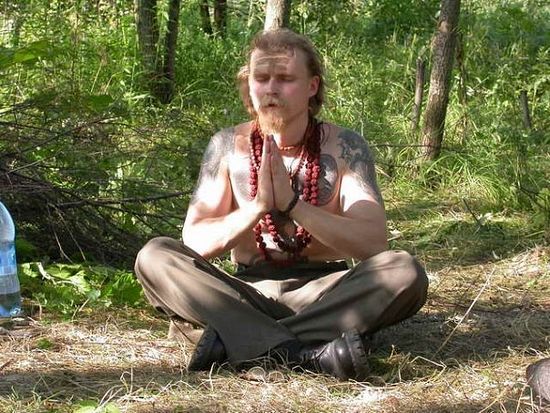
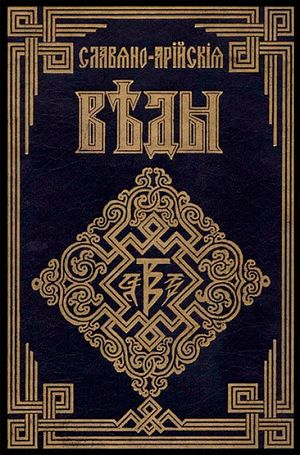


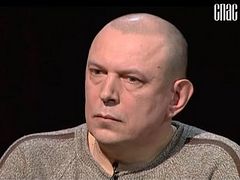
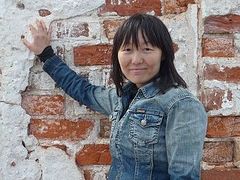
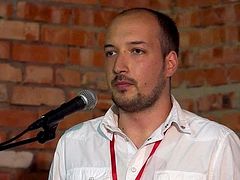
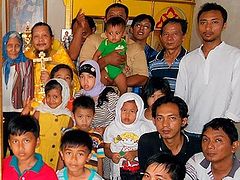
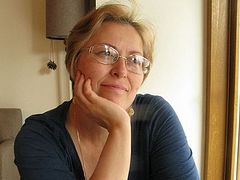
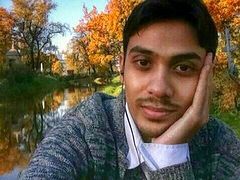
Maranatha'
I greatly enjoyed this article and I fully agreed with its message. It was an uplifting, spiritual story about finding God and coming back to Him after so long.
We are all brothers and sisters in Christ and we all serve the One True God and His Son, Jesus Christ. It always does my heart and soul good to read stories about how people came to know Christ.
No caso do Millenium, que era auto afirmado thelemita, o uso de determinados jargхes e detalhes com o intuito de acumular dinheiro com workshops, palestras e supostas iniciaзхes – fora a subtraзгo de favores sexuais que viraram tanto piada quanto um tipo de pandemia dentro do thelemismo, ocultismo, de muitos estilos de wicca ou de suposto paganismo – foram usadas pelo prуprio Millenium para que este entrasse na horrнvel, adulterada e porque nгo dizer “...petista...”, igreja universal do conhecido e famigerado Bispo “...Pedir Mais Cedo...”.
Ele teve apenas que usar o que fazia, o que via e o que incentivava, para assumir que estava fazendo o dito “...trabalho do demфnio...”, e entгo adentrar a igreja universal como um pastor, e assim poder manter seu lucro enganando crйdulos, tanto ou mais do que jб o fazia enganando pessoas no ocultismo e no thelemismo.
No caso da conversa dos citados Padre George Maksimov e do ex-rodnover Ivan Liskov, a coisa possuн elementos mais preocupantes, por outros motivos.